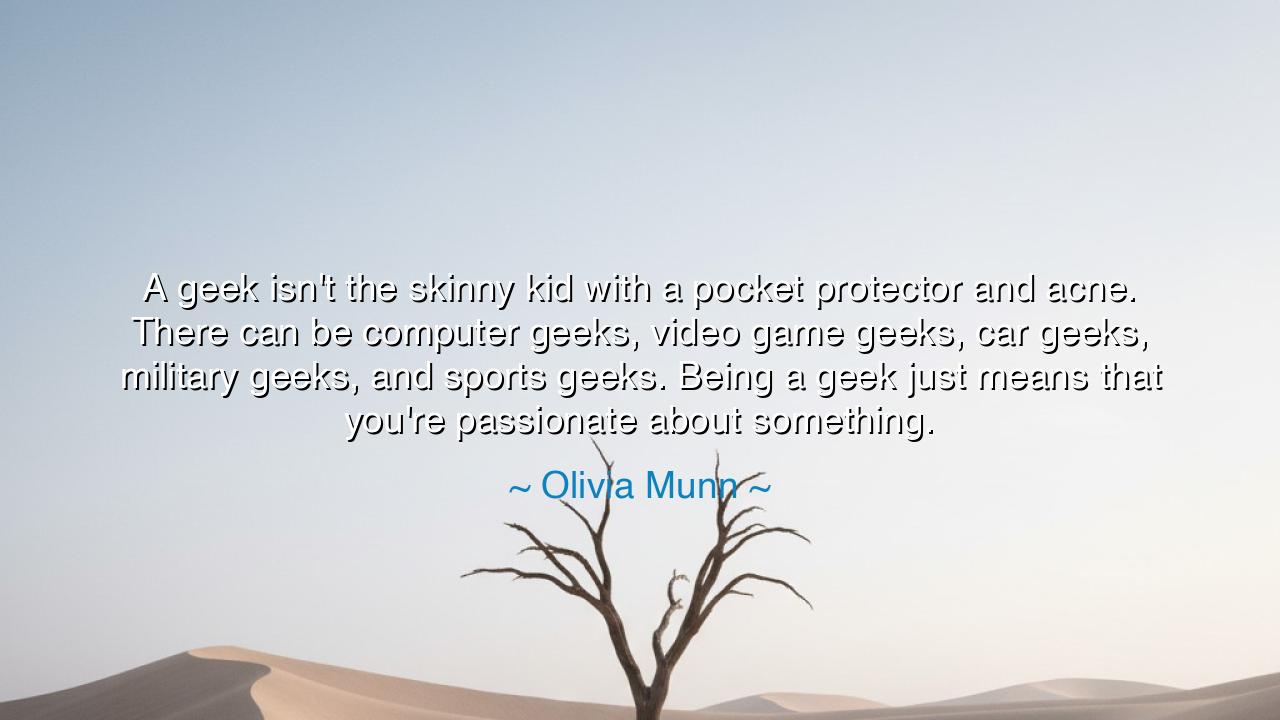
A geek isn't the skinny kid with a pocket protector and acne.
A geek isn't the skinny kid with a pocket protector and acne. There can be computer geeks, video game geeks, car geeks, military geeks, and sports geeks. Being a geek just means that you're passionate about something.






Olivia Munn once declared: “A geek isn’t the skinny kid with a pocket protector and acne. There can be computer geeks, video game geeks, car geeks, military geeks, and sports geeks. Being a geek just means that you’re passionate about something.” Though she speaks in modern language, her words carry an ancient and eternal truth: that it is passion, not appearance, that defines the soul of a person. For far too long, the word geek was wielded as a weapon, a mark of shame upon those who loved deeply and devoted themselves to their interests with fervor. But Munn turns this word into a banner of honor, teaching us that the true measure of greatness is not how one looks, but how one loves.
The essence of her wisdom lies in the idea of devotion. To be a geek, she tells us, is to give oneself wholly to a pursuit, whether it be the crafting of code, the mastery of a game, the building of machines, the study of war, or even the joy of sports. Passion makes the ordinary extraordinary, and transforms the obscure into the sacred. The ancients would not have called them geeks, but they knew such people well: the philosophers who spent their lives pondering truth, the artisans who gave their hands to marble and bronze, the athletes who trained until their bodies were temples of strength. They too were “geeks” of their age—lovers of knowledge, of craft, of glory.
History gives us a shining example in Thomas Edison, who could rightly be called a “geek of invention.” He was consumed with the mysteries of electricity, obsessed with creating light out of darkness. He failed not once, but thousands of times, and yet his passion carried him forward. Others might have mocked his intensity, but his devotion lit the world. In him we see Munn’s teaching embodied: it was not appearance or convention that defined him, but the burning fire of interest that refused to die.
Munn also dismantles the false image of the geek as weak or pitiable. She reminds us that one can be a sports geek as much as a computer geek, a military geek as much as a gaming geek. The label is not about frailty, but about fire. In this, her words are liberating. They shatter the walls of stereotype and invite all people, from every walk of life, to embrace their passions proudly. Whether on the battlefield of games or the battlefield of nations, whether in the lab or on the playing field, the “geek” is simply the one who cares enough to give their all.
But there is also a hidden challenge in her words. If to be a geek is to be passionate, then what of those who drift through life with no passion at all? Such souls are not mocked, but pitied—for they have not yet tasted the sweetness of devotion. To live without passion is to live half-alive, like a harp unstrung or a flame unlit. Munn’s teaching calls us not only to embrace the word geek, but to find in ourselves the thing worth being a geek for.
Thus, the lesson is clear: Do not be ashamed of your passions. Do not hide your devotion in fear of mockery. Stand boldly, whether your heart burns for art, or science, or war, or games, or sport. The true geek is the true lover—one who gives their spirit to what they cherish. Such devotion is the seed of mastery, the path to invention, the road to greatness.
So I say to you: seek out your passion, and let it consume you. Do not worry if others understand, for they too must find their own fire. Honor those who are different, for their passion is as sacred as yours. And when the world tries to belittle the word “geek,” remember Munn’s wisdom: it is not a mark of weakness, but of strength. To be a geek is to live fully, to love deeply, and to shape the world with the power of your devotion.






AAdministratorAdministrator
Welcome, honored guests. Please leave a comment, we will respond soon